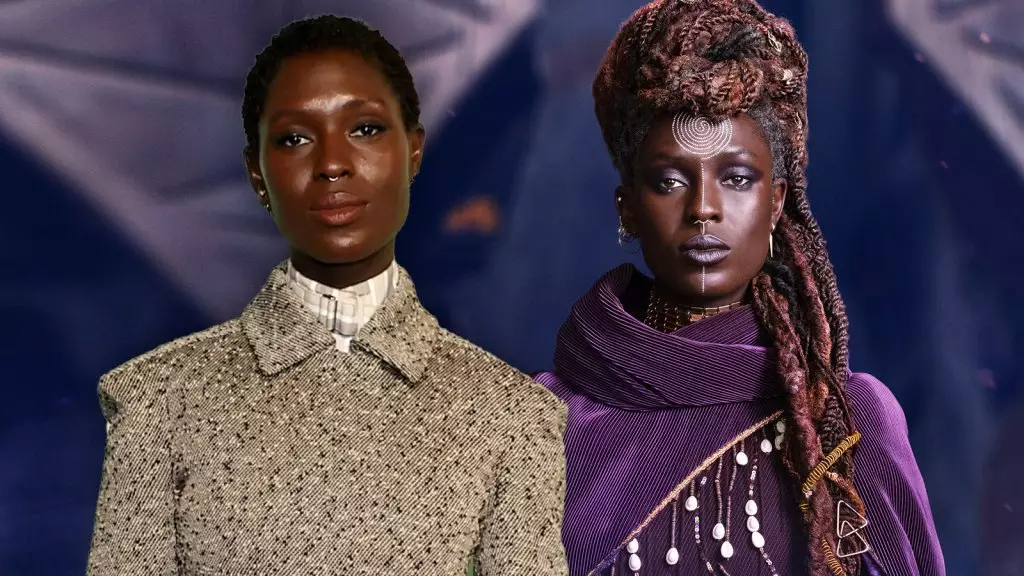In a digital age where social media platforms reign supreme, the issue of cyberbullying has reached alarming levels, particularly in the entertainment industry. Celebrities, especially those from marginalized backgrounds, often find themselves as targets of hateful rhetoric and vitriol. Jodie Turner-Smith, known for her role as Mother Aniseya in Disney’s *The Acolyte*, recently brought this pressing issue into the spotlight by critiquing Disney’s inadequate response to the cyberbullying faced by her co-star, Amandla Stenberg. This situation underscores the need for major studios to take a firm stance against online hate and protect their talent.
In her interview with *Glamour UK*, Turner-Smith voiced her profound disappointment in Disney’s failure to support Stenberg amid the backlash. She lamented the studio’s silence, stating, “They’ve got to stop doing this thing where they don’t say anything when people are getting f***ing dog-piled on the internet with racism and bullsh**.” Turner-Smith’s remarks are not just a personal grievance; they represent a larger narrative about the industry’s obligation to protect its artists. Her frustration is palpable and highlights a systemic issue where companies prioritize financial gains over the emotional well-being of their employees.
Furthermore, Turner-Smith aptly argues that studios, especially those like Disney with significant financial resources, should leverage their influence and make a stand against racism and bullying. “It would just be nice if the people that have all the money were showing their support,” she said. This comment reflects a growing expectation from fans and advocates alike that entities with substantial power utilize it to foster an inclusive environment rather than turning a blind eye.
Amandla Stenberg, an accomplished artist in her own right, has also spoken out about the “intolerable racism” she faced during the lead-up to *The Acolyte*. Her experiences reveal a grave reality for many artists of color, who often find that their contributions are scrutinized and belittled due to deeply ingrained prejudices. Stenberg poignantly articulated the emotional toll this cyberbullying took on her, emphasizing that while she anticipated some negativity, the reality was profoundly disheartening.
Stenberg’s decision to address these hateful attacks through her art—by releasing a song capturing her feelings—demonstrates the therapeutic power of creative expression. Yet, it also underscores a precarious balance between personal expression and public scrutiny. The artist eloquently criticized the appropriation of the term “woke,” suggesting that it has been co-opted by those who misuse it to belittle genuine social justice efforts.
The larger implication of this dialogue between Turner-Smith and Stenberg is a stark reminder of the responsibilities that studios hold. Major corporations wield immense power, and with that power comes the responsibility to foster a safe and supportive environment for their talent. Remaining silent in the face of cyberbullying not only reflects poorly on the corporation but also perpetuates a culture where bigotry can thrive unchecked.
Turner-Smith’s contention that a public announcement denouncing such behavior could be financially beneficial for Disney rattles the traditional narrative that speaking out against racism is detrimental to business. In fact, this perspective shifts the discourse, advocating for ethical practices that align with the values of a significant portion of their audience.
The issues raised by Jodie Turner-Smith and Amandla Stenberg highlight the urgent need for change within the entertainment industry. Studios like Disney must evolve from their current state of complacency to take proactive steps against cyberbullying and racism. It is essential for audiences to recognize the impact of their voices, and for corporations to align their practices with the values of inclusivity and respect.
As fans, advocates, and stakeholders in the film industry, it is crucial to hold studios accountable for their silence and advocate for a culture that prioritizes the emotional and physical safety of its artists. In an era where diversity should be celebrated rather than condemned, studios can no longer afford to sit on the sidelines. The time for a substantial and courageous response is now.

Leave a Reply